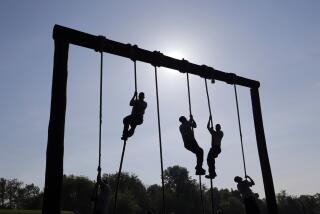Navy Says Its Sailors Must Sail : Pro Sports No Longer an Option, So Raiders Might Lose McCallum
WASHINGTON — Navy Secretary James H. Webb Tuesday banned all active duty sailors from playing professional sports, a move that could mean running back Napoleon McCallum will have to quit the Raiders.
“(Neither) Ensign McCallum nor any other individual will be given any special preference with regard to choice of duty assignments or any other decision regarding his military responsibilities,” Webb said.
“We knew when we drafted him that he did have an obligation to the Navy,” Raiders Coach Tom Flores said. “We respected that. Fortunately, we were able to have him last season and he was able to play for us. Hopefully, we can continue that relationship. Until we hear more from the Navy, we can only take a position of wait-and-see.”
Webb’s predecessor, former Navy Secretary John F. Lehman, had given McCallum a special job and allowed him to make special arrangements in order to be free on the weekends to play for the Raiders.
But Webb, who was sworn in as the Navy’s 66th secretary last Friday, said he would insist that graduates of the U.S. Naval Academy fulfill their responsibilities as naval officers on a full-time basis.
“As a general policy, no special accommodation will be made in order to allow active duty personnel to play professional sports,” Webb said.
“The military in general, and the duties of commissioned officers in particular, constitute a full-time profession.”
No individual, he said “will be given special preference with regard to choice of duty assignments or any other decision regarding his military responsibilities.”
Webb said no exception would be made for McCallum, but added, “His assignment will be made balancing the needs of the Navy and his personal desires.”
Lehman had authorized McCallum to play pro ball with the Raiders on a “not-to-interfere basis” last August after the young ensign was assigned as a supply officer on the USS Peleliu in Long Beach.
Lehman, in reviewing McCallum’s case last summer, stressed he merely was interpreting rules that apply to all naval officers, allowing them to take on part-time jobs “as long as there is no conflict with military duties.”
Pentagon sources said at the time that some of Lehman’s advisors had urged him to approve McCallum’s weekend football exploits--even though there was always a possibility of injury--because of his image and recruiting value to the service.
McCallum, an All-American who set 26 school records at the academy, subsequently worked during the day as an ensign and played football with the Raiders on the weekends.
After the football season ended, McCallum received a routine reassignment to the Navy Supply Corps School in Athens, Ga., where he is expected to graduate later this summer.
McCallum could not immediately be reached for comment.
Meanwhile, Webb said the Navy will honor a deal it made with Naval Academy basketball star David Robinson, allowing him to serve only two years’ active duty after graduating rather than the usual five.
He believed Robinson had relied in “good faith” on that understanding when he decided to remain at the academy rather than resign, Webb said.
Robinson, a senior, entered the academy at a height of 6-7 but now stands 7-1, considered too tall for unrestricted assignments on Navy ships or aircraft.
As a result, Lehman ruled Robinson would be commissioned as a “restricted line” officer--meaning he could work only in selected fields--and would have to serve only two years on active duty followed by four years in the active reserves and two in the inactive reserves.
Although that decision was not seen as one that would allow Robinson to play pro basketball immediately, given the mid-week games played by the pros, it was viewed as dramatically enhancing the chances of his being drafted by a pro team this year since he would be available in two years rather than five.
“It is clear to me from a full review of the facts that Midshipman Robinson understood that some accommodation would be made concerning his service obligation that would permit him to play professional basketball during at least a portion of his period of obligated service,” Webb said, noting Robinson could have resigned after his sophomore year.
“Consequently, it would now be unfair to require him to serve on active duty for five years.”
According to Cmdr. Steve Clausen, a spokesman for the Naval Academy, Robinson was informed Tuesday by Rear Adm. Ronald Marryott, the academy’s superintendent, that Webb would honor Lehman’s decision.
Clausen said Robinson was busy studying for final exams and unavailable to discuss the decision.
Webb, himself a Naval Academy graduate, is a highly decorated Marine combat veteran of the Vietnam War who said during his confirmation hearing last week that academy grads “should understand that being an officer is a 24-hour job.”
Graduates of the various military academies face an obligation to remain on active duty for at least five years. Such previous Navy football standouts as Roger Staubach and Phil McConkey had to complete their five-year hitches before joining the pro football ranks.


